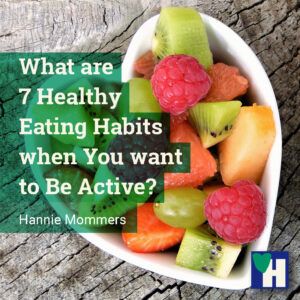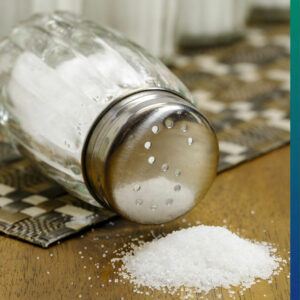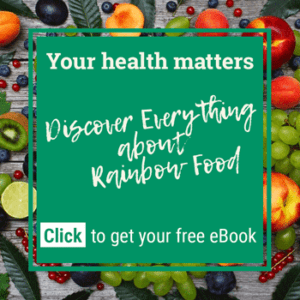
Healthy eating habits? In the Netherlands, when we were children, we ate 2 sandwiches with chocolate sprinkles or peanut butter for breakfast. The same for lunch. And at the end of the day between 5 and 6 pm the warm meal: potatoes, meat, and vegetables.
The same every day.
Later, when Tom and I had our son and wanted to be a healthy family, we changed some of these habits. Only fruits for breakfast, sandwiches with cheese for lunch, and more variation for the evening meals, alternating the usual Dutch food with rice, pasta, salads, and such. Changing the time to a hipper 7 to 8 pm.
It is obvious that the heavy stuff was digested at night. Now that we are aging we have a completely different opinion about whether those are healthy eating habits. We want to be both active and sleep well. Food plays an important role in accomplishing that.
Some of the links are affiliate links. As an affiliate associate, we earn a commission when you purchase any of the products offered through the shared links at no extra cost for you. This helps us maintain this website.
Table of contents
- 1 Why would you want to be or remain active?
- 2 Healthy eating habits strengthen our health and mobility
- 3 1. Intermittent fasting
- 4 2. Don’t drink during meals
- 5 3. Chewing, chewing, chewing
- 6 4. As many colors as possible
- 7 5. Raw vegetables are healthier than cooked ones
- 8 6. Don’t add salt to a dish that tastes good
- 9 7. Avoid refined ingredients and prepared (fast) food
- 10 Being fanatic or just trying the best we can?
Why would you want to be or remain active?

Is it important to stay active when you are aging? I hear so many people remark that they have done their share and are entitled to rest now. Do they have a point?
I don’t have to impose my opinion on others and I am not a missionary, so if anybody feels this way, it’s fine by me. The reason I do want to remain active is that it is my conviction that I will stay healthier and mobile for a longer time that way.
Healthy eating habits strengthen our health and mobility
I suppose everyone changes habits and ideas now and again, don’t you? Whether it’s about eating, exercising, or political opinions.
This can be because there is a hype all of a sudden. 40 Years ago the diet of Montignac was such a hype. Nowadays Keto is the talk of the town. And because I want to be flexible in mind I always look into these concepts.
One that has my specific interest is the concept that the environment has changed with the speed of lightning and that our primal brain is still in prehistoric time. As a result of this interest, I am changing my eating habits again.
Related: How to Control Eating Habits to Our Benefit in the Best Way
1. Intermittent fasting
The most important change is the time we eat and how many times we eat. This habit changed more or less organically.
The times of meals in Holland are around 8 am, 12:30 and 6:30 pm. The Spanish eat 5 times: 8am, 11am, 2pm, 5pm and 9pm. Give or take. Because lunch can just as well be at 4pm instead of 2. And dinner at 11pm instead of 9.
I would never sleep again if I had dinner that late, would you?
Also, lunch is the main meal, with at least 3 courses. Way different from our 2 sandwiches with cheese, isn’t it. We were quite satisfied whenever we had been out for lunch. And had no need for dinner after that.
Eating less seems to be very healthy, so we changed our habit to two meals a day. This is a change we are very pleased with. And one that gives us more energy than eating all the time!
2. Don’t drink during meals
Skip not only the alcohol but all drinks during your meals. It is necessary to drink 2 to 2,5 liters of water during the day, but don’t drink for half an hour before the meal until half an hour after you finished.
According to Robyn Youkilis in Go with Your Gut, you risk diluting the stomach’s fluids that are essential to break down food.
3. Chewing, chewing, chewing

A well-chewed hamburger is even healthier than a hardly chewed salad. Not that I propose eating hamburgers, but to give emphasis to the benefits of chewing!
It does make our meals a bit less social, I must admit. When you are chewing every bite of food at least 50 times, there is no time to talk! LOL
Chewing that much reduces the need for drinking because if you chew well enough your food will be liquid by the time you swallow. During chewing, the food mixes with saliva, which starts the breakdown of nutrients in the food.
4. As many colors as possible
Variation is one of the most important choices for healthy eating. Our body needs numerous nutrients to function properly and we largely get that from our food.
An easy way to ensure that you get a wide variety of vitamins and minerals is to put as many colors on your plate as you possibly can. Different colors mean different nutrients. I have made a collection of this in a free eBook about colored food.
—>>> Download “Use the Colors of Food to Benefit your Health” here <<<—
5. Raw vegetables are healthier than cooked ones

There are raw meats and fish you can eat, such as Sushi or Carpaccio. However, this is generally not recommended for the elderly. Raw fish and raw shellfish and crustaceans can be infected with bacteria, viruses, or dangerous parasites. And raw meat can also contain pathogenic bacteria.
For vegetables, they are healthier raw than cooked, provided they are organic. I almost forgot to mention ‘organic’, because it is so obvious to me.
The second best option is to steam the vegetables. Tom – my cook, oops I mean my husband 🙂 – always saves the water with which he steamed the vegetables, to use it for soup, or to steam next day’s vegetables in.
6. Don’t add salt to a dish that tastes good

The gourmets among us will agree that salt has a predominant taste. That’s why so much salt is often added to fast food and restaurant food. You no longer taste whether the food is really good or bad because everything tastes the same.
In earlier times, salt was used as a preservative. A good idea, because without refrigerators food will decay after a few days. And until a century ago, people put in so much physical effort that they sweated a lot. The salt was needed to make up for deficiencies in the body.
We never add salt to food, except occasionally in summer at 40C above zero. Lots of food has a natural amount of salt, so with a normal diet, you get enough salt.
7. Avoid refined ingredients and prepared (fast) food
There are absolutely no nutrients left in refined white sugar, white rice, or white flour. Even some products that are sold as whole-wheat are refined goods with an added color.
I know, at times it is annoying that you more or less must have a degree in dietetics to understand the nutrition facts on every product. Yet it’s a good idea to look at them often to know what you put inside your body.
Being fanatic or just trying the best we can?
We try to find a balance between doing the right thing and occasionally giving ourselves some leniency. Ultimately, it’s better to stick with these healthy habits than to get too enthusiastic at the start and then give up after some time.
If you have any questions, either Tom or I will gladly answer them. Put them in the comment box.


I’m very impressed with your article. I heard of many of these tips before but not necessarily the way you have worded it.
Chewing for one; what you have said makes so much since, but I’ve never thought about it in this way. I find myself eating very fast and not chewing my food near enough for the sake of time. I suppose if I would learn to slow down when I eat, I might not struggle with weight loss so much. I don’t need to lose a lot of weight, but I’ve found the older I get the harder it is to get extra weight off.
I’ve also been guilty for adding salt to my meals before even tasting them! I think I’ve finally broken this habit.
Thanks for all of these reminders on healthier eating habits. You make it so easy to understand why it’s so important.
I’ll try harder to slow it down, especially during meal time. I might actually start tasting the food I’m putting into my mouth.
Best of health,
Devara
Great resolutions you have made, Devara. And you’ll probably notice that in time you’ll eat less. That way you’ll be better able to keep your desired weight and in the end it costs you just as much time as this hastely eating you do at the moment. 🙂
Hey,
Another excellent article, and one that is important to me. I have started exercising at home again (I have a lot of weight to shift), and I need to start eating healthy again. During this lockdown I have eaten far too much, and far too much fast foods etc. So number 7 in your list is the one I am concentrating on first. Cutting out the fast foods is an absolute given for me. I’ll move on to the rest of the list when I’m satisfied and don’t crave any rubbish food anymore.
Thank you for sharing and keep up the amazing work.
All the best,
Tom
Hi Tom. A fun fact is, that if you chew your fast food at least 50 times, it’s less bad then eating it quickly. So whenever you have a craving, do that and feel less guilty 🙂
Hi,
Thank you so much for the informative article! It’s really important that we develop a healthy eating habit from a young age, so I will try out the 7 eating habits you shared some time and see if I will get more energetic and healthy! I believe I will! 🙂
Best regards,
Kelly
Good to hear, Kelly!
Great article…as we age, it is even more important to eat healthy. But why wait, when you can start now? You gave some great tips! I had no idea about #2 – no drinking during meals. Even water? I fear I’ll choke when I’m eating. All the others I’m aware of and will continue practicing – this quarantine has definitely made us gain some pounds so time to shed them.
If you can’t do without water, then don’t Dana. We are all build differently, with different habits. What you can do is for instance halve the amount you usually drink and see how it goes. Good luck!
Hi,
Thank you for your article. I think I adhere to all of the 2-7 tips, however I find it hard to commit to intermittent fasting. Me and my partner always come back late from work and by the time dinner is ready is already 8 pm. Is avoiding breakfast a good alternative to an early dinner? What do you think about this? As it is always impossible for us not to have dinner, it’s the time we connect and talk about our day and we both enjoy it.
Kind regards,
Yoana
That’s a very good reason to stick to dinner, Yoanna. And yes, some say it is even better to skip breakfast and not dinner. The reason I don’t do it that way is that I am a bad sleeper. And with a full stomach my sleep is horrible.
Take care.
Thank you very much for theses healthy eating habits, I can see I need to do some changes to my eating habits to become healthier. You are going to help many people with this article, and I am happy I stopped by and read your article today
Jeff
Thanks so much for these kind words, Jeff. And I sure hope I help people this way 🙂
Hi Hannie,
Some very sound advice.
Something that has stuck with me for many years, also happens to be one of the points you’ve listed – Have as many colours as possible on your plate.
I’ve found this has been a great way for me to get more vegetables into my diet (something that I typically skimp on a lot of the time) and this also leads to much variety.
Thank you for your free e-Book. I’m sure I can start getting even more colours into mealtimes now.
Partha
Great that you have the ebook now, Partha! Yes, the colors is a helpfull method to get all the nutrients you need. It’s also a good help to let children eat more vegetables if you let them tick off which colors they had in a day. Works like a charm with my grandkids 🙂
Initially when I tried intermittent fasting, I felt tired in the mornings however, after a few days my body adjusted and I was able to shed some weight. I am in my 9th month of intermittent fasting and feel very good within myself. It has been one of the best health decisions I have made in my life.
Thanks for this article.
Great Ekufaa. I too had some headaches the first week and feel great now. Our bodies have to adjust to changes 🙂
Hi Hannie,
Thanks for reminding us of the importance of healthy eating habits. Some of them, I’ve heard so many times from my parents, but I still forget to implement them in my daily life. For example, chew more than 50 times for each bite, this is hard to achieve since I always eat in a rush. I might need to focus on this part first, maybe start from chewing 20 times.
About the drinking, I’ve heard that drinking water before your meal can control your hunger and make you eat less, so I drink water before meals. Is it all about diluting the stomach’s fluids to break down food so that our body takes longer for digestion?
Thanks for sharing,
Matt
Hi Matt. If you count the chewing it gets boring and you will lose interest. Intending to chew until your food is liquid is a better option. Try tasting the food more, or to distinguish the tastes of different part of your food. That way you will eat more mindfully and maybe less hasty.
Read 6 tests and probably you will read 6 different opinions. No matter what the subject is. In the end it comes down to your own common sense. I think the stomach can ingest the food better when it’s diluted with saliva and that diluting it with water will prevent all the nutrients to be absorped. I feel better and less bloated when I don’t drink during and around meals. But we are all build differently. So I would suggest, give it a try and see when you feel best. 🙂
Hi Hannie.
I find you did a really good job in describing these 7 healthy eating habits.
It was a great reminder for myself to read about them.
My partner and I are quite conscious about healthy and nutritious food. We also try to be mindful eaters: taking time to enjoy are meals and not rushing it. Here I found your piece on chewing interesting. It’s actually a habit that will enhance ‘mindful eating’. Will keep that in mind! 🙂
Thanks for sharing!
Kind regards,
Catherine.
Thanks Catherine. Yes, chewing a lot will definitely enhance mindfull eating!
While we are younger, our body can more or less successfully deal with all our wrong eating habits. Unfortunately, we become aware of that only much later when we start to age and the signs start to show. Or we are lucky to read a great post like yours, which will not only warn us, but guide us as well as how to improve our health even if we did not exactly do the best for our body so far.
The one thing I have been thinking of for some time is the intermittent fasting. I’m not exactly reluctant to give it a try, but has not completely decided yet. Would you say it is better to prolong the mornings without food, or bring forward the last evening meal in order to achieve the plus hours?
The times for the shifting depend on your other habits, Hermina. If your sleep is not good, I would definitely bring the last meal forward, as the digesting of the food costs energy and thus interferes with your sleep.
If you find it hard to start intermittent fasting, why not use an app in the beginning? I have used Simple for a while. It’s a free app and gives you the possibility of trying several intervals.
Brilliant article Hannie and thanks for that.
Full of great advice and ideas on what to and when to eat.
I try and never eat after 8pm and applying mindfulness is very important when actually eating.
Best Wishes
Trevor
Trevor, 🙂